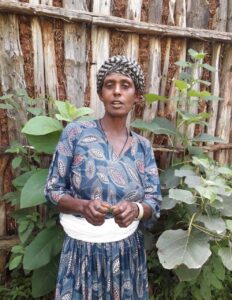To learn more about Digital Green’s AI-powered platform and how it impacts small-scale farmers in India, Ethiopia, Kenya, Nigeria and Brazil, we encourage you to sign up for our newsletter.
How Worm Composting Training Helped Increase my Income

 Emuye Muche, a 40 years old resident of Korata Kebele in Ethiopia is a mother of five children whose livelihood depends on the agricultural products she gets from her one acre of land, one cow, and five hens. Emuye started attending video dissemination sessions back in 2021 when the Development Agent set the session for the development group she is a part of at her house. Since then, Emuye has attended video dissemination sessions on poultry production, vermicomposting, maize side dressing, maize sowing, compost, urea molasses block preparation, PICS bag, nutrition, and vegetable production. She said: “what changed my life is the vermicompost preparation training, which was my first practice in video extension. I was surprised with the produced compost displayed in the video, which had a very attractive dark brown color like roasted coffee powder, my favorite powder. I learned from the video that it can replace Urea fertilizer, which is useful for vegetable and other crop productions. I learned that the production bed was prepared with local material at a shadowy place to prevent direct sunlight and predator birds from eating the worms. I also understood that all the materials for this compost preparation are not from outside of our area but are locally available materials.” home.”
Emuye Muche, a 40 years old resident of Korata Kebele in Ethiopia is a mother of five children whose livelihood depends on the agricultural products she gets from her one acre of land, one cow, and five hens. Emuye started attending video dissemination sessions back in 2021 when the Development Agent set the session for the development group she is a part of at her house. Since then, Emuye has attended video dissemination sessions on poultry production, vermicomposting, maize side dressing, maize sowing, compost, urea molasses block preparation, PICS bag, nutrition, and vegetable production. She said: “what changed my life is the vermicompost preparation training, which was my first practice in video extension. I was surprised with the produced compost displayed in the video, which had a very attractive dark brown color like roasted coffee powder, my favorite powder. I learned from the video that it can replace Urea fertilizer, which is useful for vegetable and other crop productions. I learned that the production bed was prepared with local material at a shadowy place to prevent direct sunlight and predator birds from eating the worms. I also understood that all the materials for this compost preparation are not from outside of our area but are locally available materials.” home.”
As a result, she began preparing vermicompost at home and recalled: “My elder son and I prepared ourselves to practically implement the activity. The first thing we did was collect cow dung from the field. Then, I prepared the composting bed in my backyard and brought the worms to start and manage them. I remember that the initial numbers of worms that I used were 22 in number but thanks to God, I currently have thousands, and recently, I distributed them to 12 farmers who are willing to adopt the practice.”
activity. The first thing we did was collect cow dung from the field. Then, I prepared the composting bed in my backyard and brought the worms to start and manage them. I remember that the initial numbers of worms that I used were 22 in number but thanks to God, I currently have thousands, and recently, I distributed them to 12 farmers who are willing to adopt the practice.”
Emuye began compost harvesting about 1 and a half years ago and has been utilizing it for her backyard vegetables, fruits, and maize productions. She stated that she applied the compost immediately after harvest and cannot remember the exact amount of production, but that it is estimated beyond 65 Qt. She applied it for lettuce, cabbage head, and Swiss chard last year and understood that it is more important for vegetables and can replace inorganic fertilizer. Emuye shared: “this year I used the compost mainly for Greenhouse Tomato production and maize farms. My farm soil was acidic and it was very difficult for me to produce maize even though utilizing inorganic fertilizer. But now, thanks to the vermicompost, I have grown my maize to 0.125 ha and the difference is visible. As a result of the vermin fertilizer, I have saved 2500 ETB that I used to spend to buy artificial fertilizers. My backyard farm used to be bare due to the acidity problem and knowledge gap, but now you can see my farm full of tomatoes and my living status has improved” She also said that her son is interested in attending the video dissemination sessions even though he is not part of the development group and is supportive of her effort to adopt the improved agricultural practices she learned from the videos.